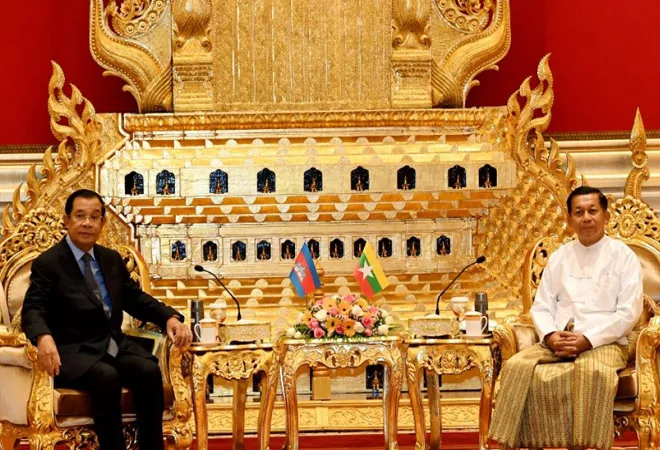-
CENTRES
Progammes & Centres
Location
Cambodia’s recent visit to Myanmar has triggered global criticism. Would Cambodia as the new ASEAN Chair be able to maintain ASEAN unity in the face of the Myanmar crisis?

The year 2022 began with the most awaited visit of the current ASEAN Chair, Cambodia, to Myanmar. This visit invited quite a controversy as this trip could be seen as a step towards legitimising the Junta leadership and acknowledging the recent coup—the very reason for which Myanmar was excluded from previous ASEAN meetings. While this has been met with condemnations both globally and within Myanmar, Cambodia hopes to thaw the ice for future dialogues to take place.
The Cambodian Prime Minister Hun Sen’s visit to Myanmar marks the first visit made by a foreign leader since the military seized power in Myanmar last February. During his two-day visit on 7 and 8 January, Hun Sen met with Senior Gen Min Aung Hlaing and other leaders of the military administration, for talks aimed at resolving the country’s tangled political, economic, and humanitarian crises. As Cambodia holds the rotating chairmanship of ASEAN this year, the PM’s trip was seen to be another effort to implement a five-point ASEAN peace plan adopted last April and amend the impact of the Myanmar crisis on regional security which affected the unity, credibility, and centrality of ASEAN as a rules-based organisation.
The February coup in Myanmar certainly breached the ASEAN Charter when viewed through the lens of the rule of law, good governance, and democracy, but any prospective response by ASEAN runs against the principle of non-interference.
In 2021, ASEAN broke free from a self-imposed impasse created by the non-interference policy it has upheld since its foundation. The February coup in Myanmar certainly breached the ASEAN Charter when viewed through the lens of the rule of law, good governance, and democracy, but any prospective response by ASEAN runs against the principle of non-interference. Until last year, whenever ASEAN has faced a dilemma, it has let itself be hamstrung, opting for a wait-and-watch approach. The 2014 coup in Thailand is an example of such an approach. This fostered the impression that democracy within ASEAN is on the decline. If ASEAN had simply sat back and waited throughout the Myanmar crisis, the bloc's reputation with the international community would have been in tatters, casting doubt on the concept of "ASEAN centrality".
A firm approach was subsequently attempted via the Five Point Consensus in April 2021. This consensus is a gradual strategy that offers a way for ASEAN to begin negotiations with the Myanmar military regime through diplomatic engagement. It calls for an end to violence, the beginning of political discussion including all parties within Myanmar, and the creation of an opening of an ASEAN Special Envoy to commence the process for negotiations and dialogues.
If ASEAN had simply sat back and waited throughout the Myanmar crisis, the bloc's reputation with the international community would have been in tatters, casting doubt on the concept of "ASEAN centrality".
Military members, including Min Aung Hlaing, were barred from attending the ASEAN summit discussions in October after the former refused to allow the Special Envoy elected by ASEAN members to meet with all parties concerned in Myanmar. A representative from Myanmar was invited to attend the summit; however, this step was considered impolite for the new military leader and thus the nation refused to participate in the ASEAN Summit where leaders from the United State, China, and India were present. Subsequently, Myanmar’s absence was felt in the China–ASEAN Summit in November. What turned heads was the participation of the National Unity Government (the shadow government) in the formal ASEAN climate and disaster conference. While it shows elements of the growing frustration with Myanmar general’s stubbornness to change his ways, this step did not go down well with nations backing Myanmar within the bloc: Vietnam, Laos, and Thailand.
A change around the approach took place with Cambodia taking over as the ASEAN Chair for 2022. PM Hun Sen made the bloc’s intention clear to pursue a pragmatic engagement policy with Myanmar's military administration, defying ASEAN's collective decision to exclude the Junta from the bloc's meetings unless progress on the Five-Point Consensus was initiated. He emphasised that under the ASEAN Charter, no ASEAN member state has the authority to eject another member, which he sees as a reflection of the long-standing non-interference principle.
PM Hun Sen made the bloc’s intention clear to pursue a pragmatic engagement policy with Myanmar's military administration, defying ASEAN's collective decision to exclude the Junta from the bloc's meetings unless progress on the Five-Point Consensus was initiated.
The subsequent visit in the second week of January yielded few immediate breakthroughs. Min Aung Hlaing offered to extend a ceasefire with the ethnic armed groups until the end of the year, according to a joint statement released on 7 January that described the negotiations as "frank and forthright". The military leader further stated that as ASEAN's Special Envoy, Prak Sokhonn will be allowed to speak with all parties involved in the country's political crisis, including the armed ethnic minority groups. Both presidents also vowed to push for a summit to coordinate humanitarian aid deliveries.
While this visit has been said to bring about the desired effect, however, the ground situation within Myanmar remains fraught with ethnic–military disputes. The divide and rule policy applied by Junta to fight some ethnic groups, while keeping others at bay by providing ceasefires continues. The number of air bombings in the Kayin state, Sagaing’s Kathar township has shaken the nation in the past few days. Clashes with Ta'ang National Liberation Army, Karen National Liberation Army, and others are ongoing, raising casualties and displacing thousands of civilians. As of now, since the coup, the police and army have killed at least 1,447 civilians, detained nearly 8,500, and injured millions.
The military leader further stated that as ASEAN's Special Envoy, Prak Sokhonn will be allowed to speak with all parties involved in the country's political crisis, including the armed ethnic minority groups.
The conviction of ex-state counsellor Aung San Suu Kyi for four more years following Hun Sen’s visit on 10 January shows the military’s willingness to continue its stance of suppressing the democratic regime. Seven more such verdicts are scheduled in a few months while five more corruption charges have been slapped on her. As Myanmar remains in turmoil, member states are waiting to see if Cambodia, the Chair for 2022, can demonstrate its leadership by not isolating Myanmar while providing guidance and preserving the ASEAN unity. The bloc seems divided at the moment by Sen’s actions that resulted in the postponing of the ASEAN foreign minister’s meeting that was to be held last week for an indefinite period of time.
Cambodia's role will be critical in determining ASEAN's future course, as the Myanmar crisis will continue to be a litmus test for the organisation's legitimacy and unity. Cambodia was the Chair of ASEAN in 2012, and its stance in ASEAN meetings based on China's actions in the South China Sea significantly harmed ASEAN unity. This time, Cambodia has an opportunity to redeem itself. Whether it will fail or rise up to the occasion will be interesting to watch. Myanmar's compliance with the Five-Point Consensus will necessitate a new approach that combines firmness and flexibility.
As the coup progresses to complete one year in the next few days, it will be crucial to note whether the military regime will finally adhere to the Five-Point Consensus by allowing to negotiate with the ASEAN Envoy or will it continue to act against the consensus by prolonging violence or human rights abuses that undermine democratic transition.
Tarushi Singh Rajaura is a Research Intern, ORF
The views expressed above belong to the author(s). ORF research and analyses now available on Telegram! Click here to access our curated content — blogs, longforms and interviews.

Sreeparna Banerjee is an Associate Fellow in the Strategic Studies Programme. Her work focuses on the geopolitical and strategic affairs concerning two Southeast Asian countries, namely ...
Read More +